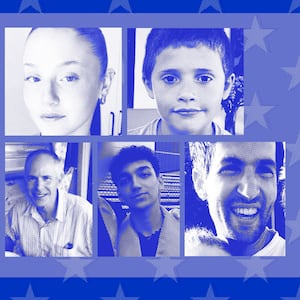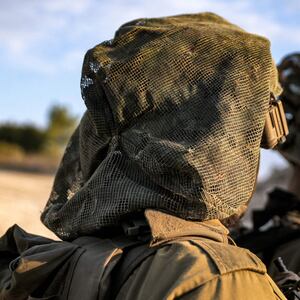The Daily Beast correspondent in Gaza is anonymous for safety reasons.
GAZA CITY—The offices of the small media production company he set up have been bombed into oblivion twice, his own family has been caught in the missile strikes he’s covered, and he lost both his legs while out on assignment.
And yet, Momen Fayez Qreqe still goes out to work every day as a journalist in the Gaza Strip.
With 46 journalists dead since Oct. 7, it must be one of the most dangerous jobs in the world. Three journalists who are still working—and the family of one who was killed in an airstrike—told The Daily Beast how they have tried to keep telling the story of this war despite losing their homes, their colleagues and, in one case, their twin brothers.
Fayez says he had both legs amputated after being caught in a missile strike while covering an Israeli Defense Force incursion in the east of Gaza in 2008, but he describes the current war as the most challenging he has covered in 17 years of journalism.
The 36-year-old freelance photographer, who takes photos from his specially adapted car or his wheelchair, is now homeless after his neighborhood was bombed.

Momen Fayez surveys the damage in Gaza City during the Israeli bombardment.
Credit: Courtesy of Momen Fayez Qreqe“Currently, I’m working and living in my car,” he told The Daily Beast. “I’m the living martyr. I’ve felt like I’ve died multiple times while covering this war. I’ve witnessed numerous strikes demolishing buildings and streets while I was on the move for coverage. The glass of my car was broken in one of the strikes.”
Despite the carnage, and the impact on him personally, Fayez has never considered quitting. “This is my job. I was working as a journalist before even completing my university studies and I will keep covering the truth. The Palestinian issue is worth having people who sacrifice their lives to report the truth happening on the ground.”
Fayez’s wife and children are staying with relatives in a small house in Gaza City but many of his extended family are sheltering at U.N. schools or hospitals in the city. On Oct. 17, he felt a pang of pure terror when the most deadly blast of the war so far hit the Ma’mdani hospital. “I knew around 100 individuals from my extended family and neighbors were there. I was praying to find them alive. It’s only a three-minute drive to reach them,” he said.
“At Ma’mdani Hospital, I began recording the shocking event when my injured sister and her three children emerged. I stopped recording and took them in my car to al-Shifa Hospital. I returned to the scene to assist the others… The ambulances were prioritizing to take the living people to al-Shifa then the dead or half-dead as the number of people was huge. I found myself one of the medical team.”
The U.S. believes it was a misfired Palestinian rocket that hit the hospital, but whatever the cause, the impact was horrific with hundreds dead. Thankfully, Fayez’s family survived.
The same can’t be said for Ali Jadallah, another photojournalist, who has continued to cover the war despite tragedy striking his own family.
The 35-year-old, who joined the Turkish Anadolu News Agency in 2014 after freelancing for agencies such as Reuters and the Associated Press, traveled to Sheikh Radwan to cover a bombing on Oct. 11, knowing full well that many of his family were sheltering in the area at the time.

Ali Jadallah documenting the results of Israeli airstrikes in Gaza.
Courtesy of Ali Jadallah“I was anxious all the way until I reached the site,” he told The Daily Beast. He arrived to find that his family’s home had been hit.
“I put my camera aside and joined the rescue team in searching for my father, brothers, sister, and mother,” Jadallah said. “We found the two brothers lifeless, then our sister. Fortunately, I heard my mother’s voice calling out, ‘I’m here, bring me out.’”
His mother and sister survived with severe injuries, but his father's dead body was retrieved from the rubble the following day. His younger twin brothers were also among the dead.
Two days later, Jadallah’s wife and kids moved to the south of Gaza after a warning from the IDF that but he had to remain in Gaza City to continue to cover first the aerial bombardment and now the ground invasion.
“Since Oct. 13, I haven’t seen my children; the Israeli army has divided the Strip. It‘s too risky to move to the south,” Ali said, sadly. “For the first time, I feel lost. They have taken my beloved father and brother, and now my sister and mother are injured. My wife and children are far away, and I can't help them or know what to do.”
Reporters Without Borders (RSF) says that over 50 media offices have been damaged or destroyed by Israeli airstrikes. On Oct. 28, the IDF told the Reuters and Agence France-Presse news agencies that they could not “guarantee the safety of their journalists in Gaza.” Less than a week later, the AFP bureau in Gaza was attacked.

“What is happening in the Gaza Strip is a tragedy for journalism, with more than one reporter a day killed since 7 October,” said Jonathan Dagher, head of RSF’s Middle East desk.
The NGO accuses Israel of a “lack of interest” in protecting journalists. On Thursday, an Israeli lawmaker and former permanent representative to the U.N. wrote on X that journalists who covered the original Hamas attack would be killed. In response to a report asking whether some of the photographers may have been tipped off about the impending assault, Danny Danon said the IDF would “hunt them down together with the terrorists.”
Four Israeli journalists were killed during the Hamas attack on Oct. 7, including Roee Idan, of the YNet newspaper, who continued to take photos of the terror attack right up until he was murdered.
Salama Ma’rouf, head of the the Hamas-run Gaza media office, told The Daily Beast that attacks that killed journalists should be considered “assassination operations” and amounted to war crimes. “According to all international laws, Palestinian journalists must be protected,” he said.
Ma’rouf also claimed that Israel had succeeded in taking down several Palestinian news sites via electronic attacks. The news sites in question are linked to Hamas, Islamic Jihad, or the de facto government of Gaza.
Salam Meima, chair of the Women Journalists Committee in the Gaza Media Hub, was killed in the early days of the war. On Oct. 10, an airstrike hit her home in the Jabalia refugee camp.
Her mother, Um Ibrahim, spoke to The Daily Beast at al-Shifa hospital where she was looking after her grandson, Ali, 6. She said their home was destroyed by the blast and the family was trapped inside.
“I kissed the hands and feet of the rescue team, pleading with them to go back to save her,” she explained. “But they refused to go back, citing their lack of resources after 24 hours since the strike. There was no fuel and no time to look under the rubble… But there was time; they could have saved her.”
Meima’s father refused to wait for the Civil Defence to help and began searching through the rubble himself. On the second day, he found Meima’s son, Ali, still alive. He was the only survivor. Eventually the bodies of Meima, her husband and her daughter were located.

Mohammed Aloul, aged 39, works as a freelancer for Anadolu News Agency in Gaza. He was in the midst of covering Israeli airstrikes in southern Gaza when a series of strikes targeted the street where he lives on Nov. 4.
“I rushed immediately to the Maghzai refugee camp to find my family buried under the rubble of our house, which was demolished along with many other homes in the vicinity,” Aloul told The Daily Beast.
“My children, brothers, and sister and their children were all trapped under the debris. Tragically, four of my children lost their lives, and my wife and fifth child sustained critical injuries. Three of my brothers were killed while my sister remains trapped beneath the rubble,” he said. “Our house was full of civilians, and our neighbors included people working for the Palestinian Authority and UNRWA. Why did they bomb and kill 33 individuals in this area, including my children?”
Aloul said he is wracked with deep sorrow and pain, and unable to explain how he can go on. “Israel wants to kill every journalist who covers the truth,” he said. ““My children used to plead with me to quit this perilous job… I have chosen to work as a journalist to keep the Palestinian stories alive.”








